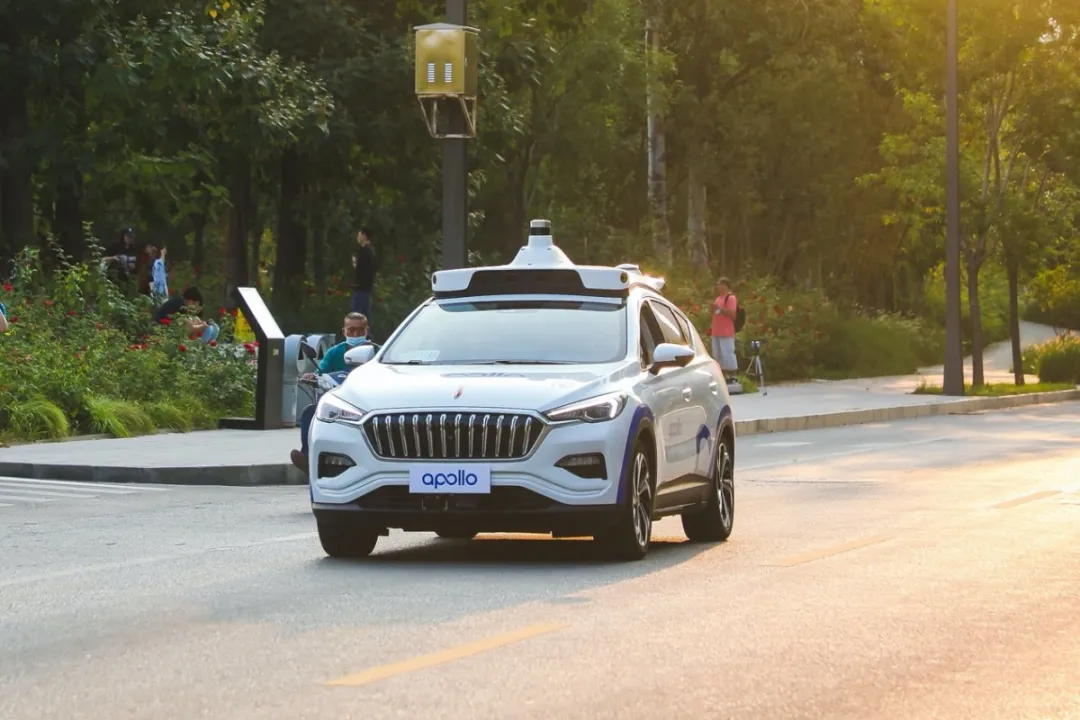Author: Yu Peng
Some people think that autonomous driving is the future, while others think that autonomous driving is a bubble.
Lyft, positioning itself as a provider of various Robotaxi ride-hailing services and fleet management platforms, recently announced the sale of its autonomous driving business to Woven Planet, a subsidiary of Toyota, for $550 million. This comes just under half a year after Uber sold its autonomous driving division ATG to Aurora at the end of 2020, its longtime competitor.

The road ahead is long and arduous, and some people turn back halfway, while others continue to climb.
Global renowned consulting firm Guidehouse recently released its latest list of the most competitive autonomous driving companies. Based on execution and strategy capabilities, Waymo, NVIDIA, and Chinese firm Baidu are considered to be in the “leadership” position at the forefront while Tesla, which has been the talk of the town in recent years, is classified as a “follower.”
This is the second year in a row that Waymo has entered the “leadership” camp in the Guidehouse report. Similarly, Baidu has also entered the “leadership” position on the list for a second consecutive year.
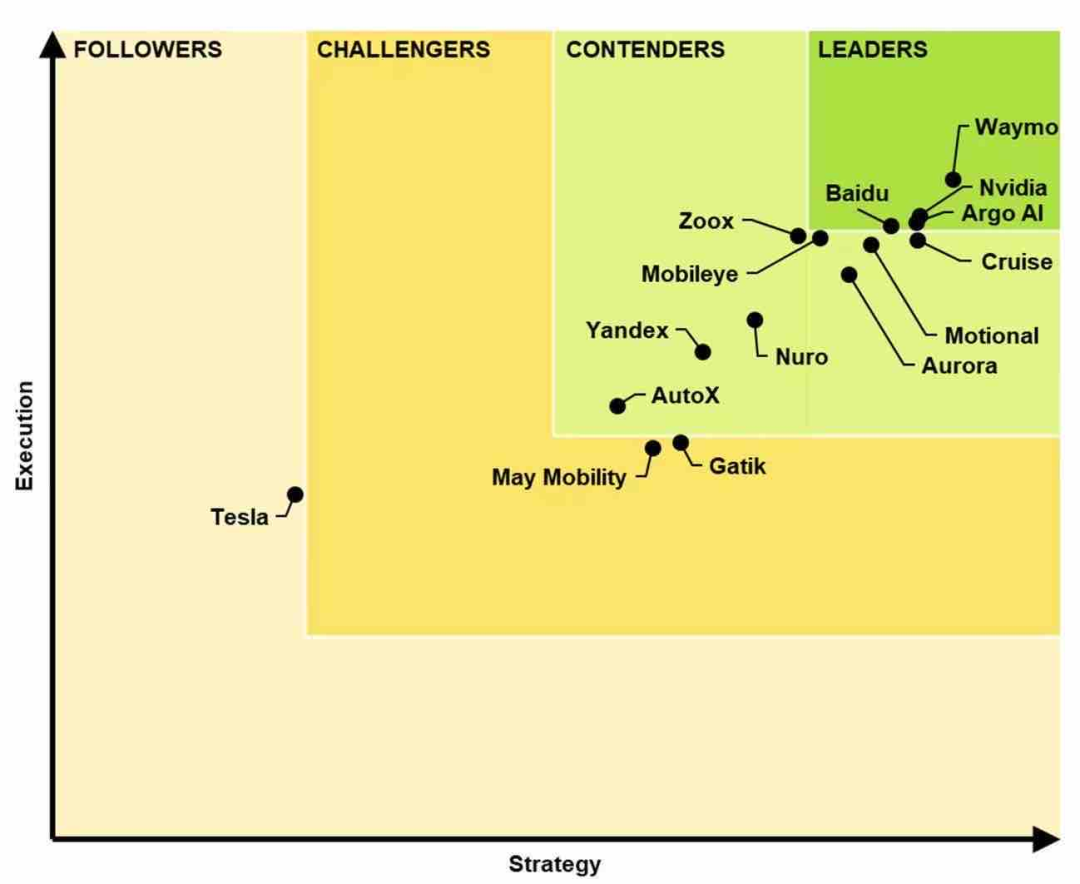
It is undeniable that the development, implementation and evolution of autonomous driving is a long-term process. Nonetheless, whether open or closed, conservative or aggressive, one step at a time is crucial.
For the industry, only those participants with solid technology and efficient commercialization can qualify for the next game.
Scaling New Heights and Laying Eggs Along the Way: Baidu’s Technology Commercialization Pathway
The Guidehouse autonomous driving competitiveness list comprehensively assesses 15 global autonomous driving companies based on 10 dimensions including the company’s vision, market strategy, partners, production strategy, technology, commercialization level, and research and development progress.
As the only Chinese company to continuously enter the top tier of autonomous driving, this is behind Baidu’s profound understanding of the industry after years of involvement in the field of autonomous driving.
In the process of advancing technology evolution and implementation, Baidu Apollo has also encountered obstacles that must be overcome. “Although the experience of L4 autonomous driving vehicles is getting better and better, there are still uncertainties in achieving true unmanned operation and safety” said Li Zhenyu, Senior Vice President of Baidu Group and General Manager of Intelligent Driving Division, at the Baidu Apollo Ecological Conference.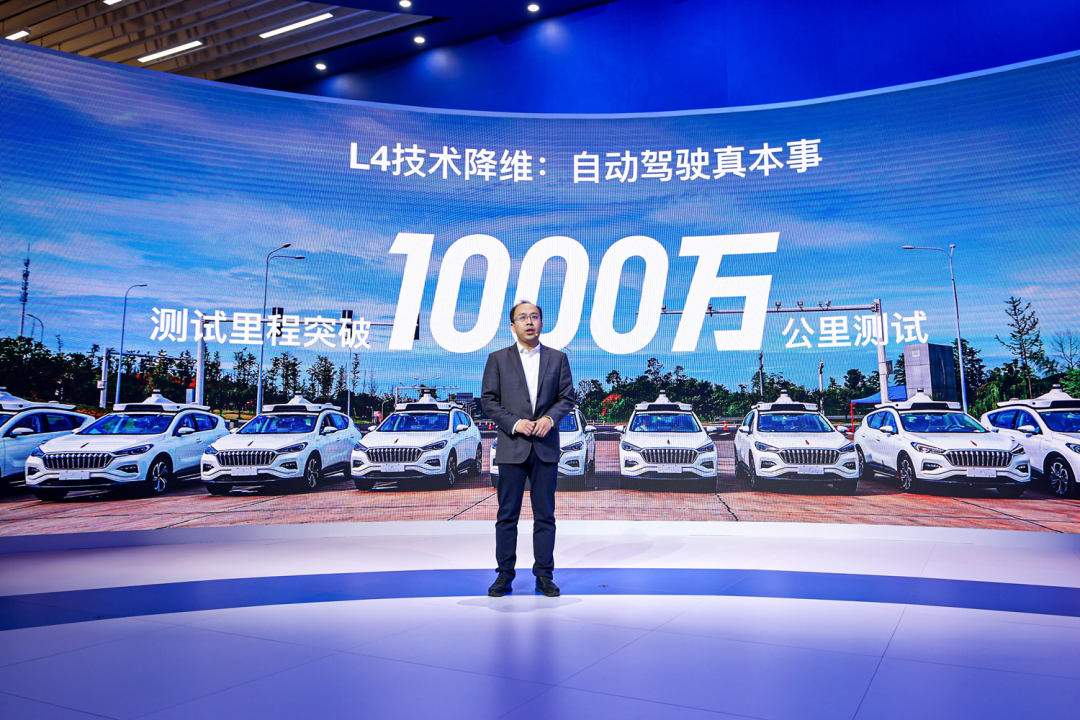
He described the actual experience of autonomous vehicles as “bugs that are well known to everyone.”
The advocacy of L4 autonomous driving in the commercial environment, and even playing word games with users, is all unsettling.
There is no distinction between large and small problems on the road. Baidu Apollo’s solution is vehicle-road coordination.
In Baidu’s view, vehicle-road coordination has the characteristic of comprehensive perception without dead corners, and the analysis of comprehensive perception information and scene semantics can make autonomous driving safer and more intelligent. At the same time, the cost of single-vehicle intelligence is transferred to road equipment and edge computing, and the cost of onboard sensors can be reduced by 30%. In addition, the red and green lights at the intersection can accurately perceive the road conditions and optimize the timing through sensors, thereby ensuring high efficiency and real-time safety of traffic, saving police force, and significantly improving commuting efficiency.
Baidu chose to take “smart cars + intelligent roads = the best solution for autonomous driving” as the technical path. To summarize it in a sentence within Baidu Apollo, it is “climbing high mountains and laying eggs along the way.”
Full autonomous driving is the ultimate summit, and laying eggs along the way is to find opportunities during the process. In the short term, Baidu will find commercial landing methods that can be commercialized to support the long-term realization of autonomous driving.
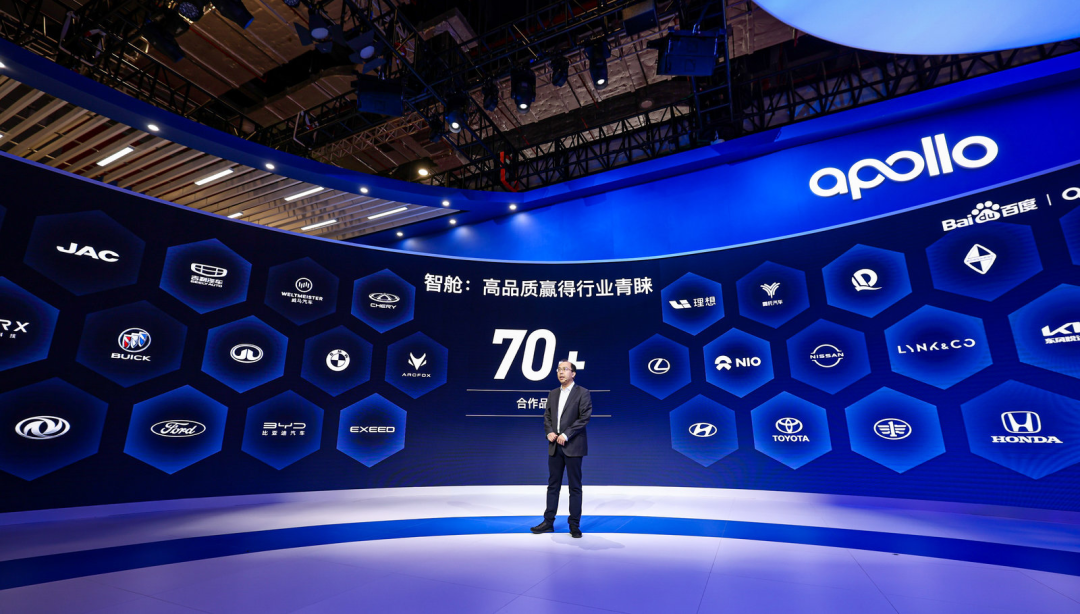
On the occasion of the 2021 Shanghai Auto Show, Li Zhenyu, the head of Baidu Apollo, announced the latest progress of Baidu’s autonomous driving business:
The accumulated test mileage of Baidu’s L4 autonomous driving has exceeded 10 million kilometers, and mass-produced models developed by L4 autonomous driving technology have begun large-scale operations in Beijing, Shanghai, and Guangzhou;
Baidu Apollo has established cooperation with more than 70 global automobile brands, and more than 600 vehicle models are equipped with Apollo’s intelligent automotive products;
Starting from the second half of 2021, Baidu Apollo’s autonomous driving will have a new mass-produced model on the market every month, and it is expected that the installed capacity of mass-produced vehicles will reach 1 million units within 3 to 5 years in the future;
From the information revealed by Li Zhenyu, many of them are already established facts, and more are collaborative promotions that are already on the road.
The path chosen by Baidu Apollo has shown initial results.
Flexible and open “Lego-style solutions”
Baidu has always emphasized itself as an artificial intelligence company.
Regarding the automotive business, Baidu also regards intelligent driving as the focus of its layout.After nine iterations, the Apollo autonomous driving platform has become a complete open solution. Baidu Apollo has evolved from the earliest single vehicle autonomous driving strategy to a mature system that integrates single vehicle intelligence with Vehicle-to-Everything (V2X) communication.
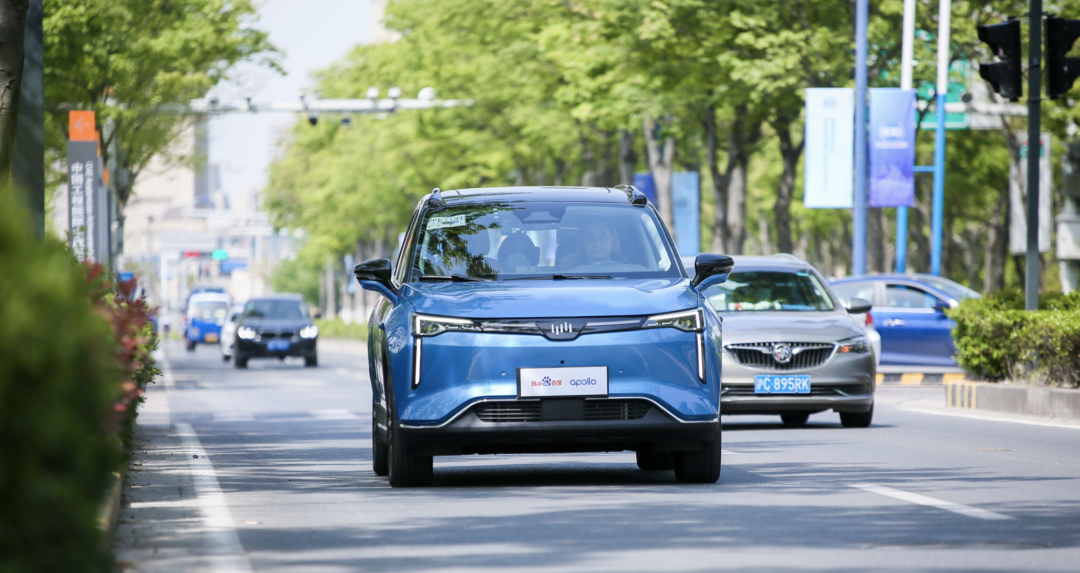
After sorting out its product line, Baidu released the “LEGO-style Intelligent Automotive Solution” in December 2020, forming four different product lines: Intelligent Driving, Intelligent Cockpit, Intelligent Map, and Intelligent Cloud. The flexible custom assembly method is more friendly to business partners with different needs.
“Intelligent Cockpit” is aimed at partners with front-loading needs such as intelligent cockpit and in-vehicle OS. More than one million intelligent vehicles have been equipped with Xiaodu Car OS, a front-loaded production platform.
Among the partners of “Intelligent Driving” which is related to autonomous driving technology, WM Motor, Guangzhou Automobile and others are impressive. Baidu provides the AVP Automated Valet Parking, ANP Advanced Intelligent Driving Solution (Apollo Navigation Pilot), and ACU Core Computing Unit products to achieve flexible empowerment of autonomous driving technology.
“Intelligent Map” of Baidu Apollo is a smart navigation system based on Baidu AI map data production technology. It can already realize the combination of autonomous driving and V2X vehicle-to-road communication.
Around the increasingly refined demands of automakers, Baidu Apollo has also launched “Intelligent Cloud” products, forming an automotive cloud solution that integrates autonomous driving cloud, automotive AI, marketing brain, and safety brain.
Now, Baidu Apollo can support OEM manufacturers to quickly build their own intelligent capabilities. With Apollo’s support, automakers can shorten the autonomous driving R&D cycle, which took at least seven years, to just six months. This undoubtedly has a considerable degree of appeal for manufacturers needing to create differentiation in autonomous driving competition.
For the open cooperation of the LEGO-style intelligent automotive solution, Li Zhenyu, the head of Baidu Apollo, described it as “many hands make light work”.
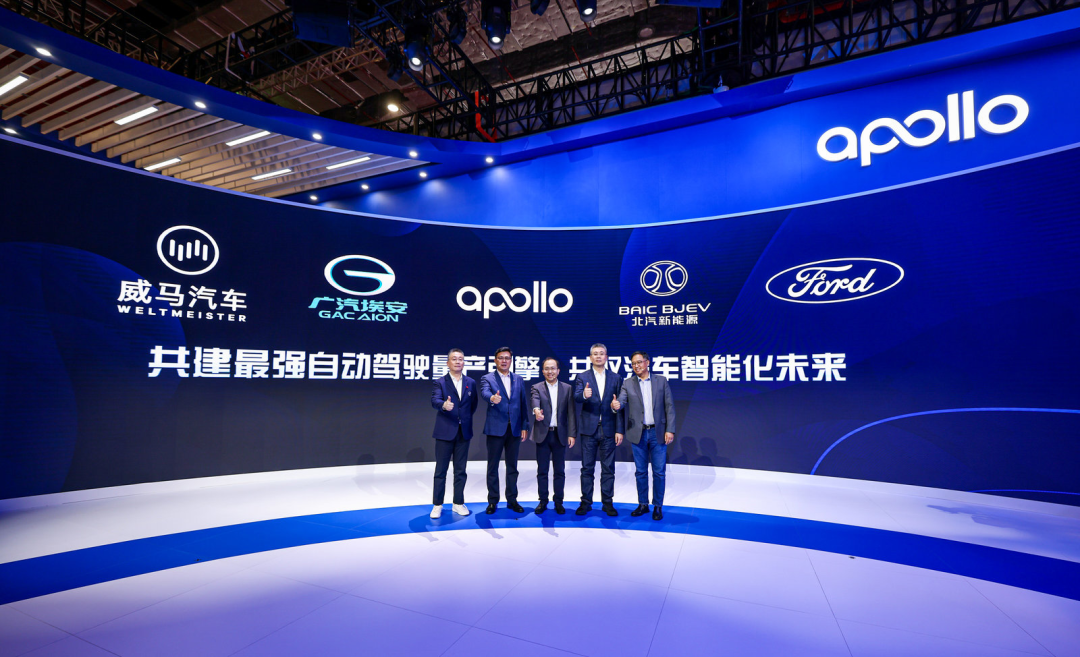
If Guidehouse’s rankings are recognition from industry observers, then Baidu Apollo has proven the feasibility of its technology transformation and autonomous driving landing mode.Translation:
We can never expect only one voice in an industry that is in the upward trend. With the passage of time, more technologically advanced and financially strong new players have entered the game with their own tactics. However, the advantages brought by Baidu’s years of accumulation in the field of autonomous driving are not something that can be shaken overnight.
Anyway, the future is worth looking forward to.
This article is a translation by ChatGPT of a Chinese report from 42HOW. If you have any questions about it, please email bd@42how.com.
